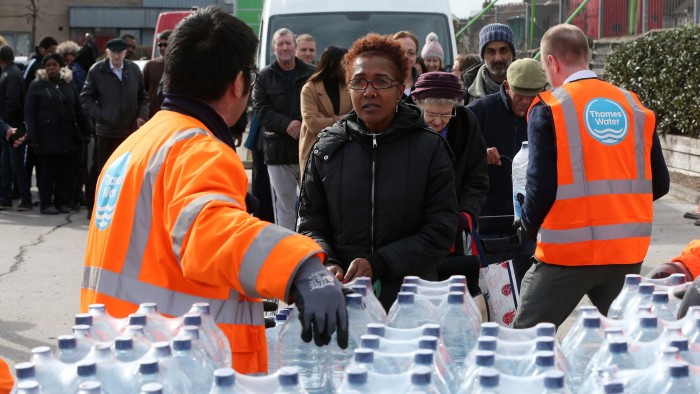Stay informed with free updates
Simply sign up to the Utilities myFT Digest — delivered directly to your inbox.
Water companies will be forced to pay higher compensation to customers in England who suffer from problems including sewer flooding or low water pressure under new rules to be set out on Tuesday by the government.
Households that suffer from internal floods of sewage could receive automatic payments of £2,000 or more under the plans, up from £1,000 under current rules.
Payments for low water pressure will jump from £25 at present to as much as £250 under the changes to industry standards called the “guaranteed standards scheme”, which is designed to give a baseline of customer service for the water and sewerage industry.
Environment secretary Steve Reed said customers had been too frequently let down by water companies when facing issues such as disrupted supplies and contaminated tap water.
“We are clear that the public deserve better compensation when things go wrong, so I’m taking action to make sure this happens,” he said. “This is another step forward in our plans to reform the water sector.”
The reforms, which will be introduced through secondary legislation, were welcomed by the Consumer Council for Water, which said that the changes were long overdue.
Water companies are negotiating with Ofwat the extent to which they can raise real-terms bills over the five years to 2030, with a final decision expected at the end of this week.
In July the water regulator angered the sector by rejecting its demand for an average 29 per cent increase in bills in favour of a 19 per cent rise. Water companies argue they need to lift bills because of increased regulatory costs and because they want to carry out ambitious investment schemes.
But water companies have been the subject of growing public anger over a mixture of storm water and raw sewage pouring into rivers and coastal waters, threatening human and environmental health.
Separately the post-Brexit environmental watchdog on Tuesday said it had found “failures to comply with environmental law” on multiple fronts by Ofwat, the Environment Agency and the Department for Environment, Food and Rural Affairs (Defra).
The Office for Environmental Protection examined the circumstances in which the regulatory system allowed untreated sewage discharges to take place, after receiving a complaint from WildFish, formerly known as Salmon & Trout Conservation UK.
“We interpret the law to mean that they should generally be permitted only in exceptional circumstances, such as during unusually heavy rainfall,” the OEP said. “While the public authorities are now taking steps to ensure their approaches are aligned and reflective of the law, we have found that this has not always been the case.”
The Environment Agency said it would carefully consider the OEP’s notice and was “transforming our approach with more people, powers and data alongside better training for our staff”.
Defra said it welcomed “the OEP’s acknowledgment that this government is rectifying the issues identified” and would “carefully consider the OEP’s allegations of breaches before formally responding in due course”.
Ofwat said it was “actively taking steps to remedy the issues the OEP has identified” and would “continue to prioritise our enforcement investigation into all wastewater companies which started in 2021 to ensure that companies are meeting their environmental obligations”.
Read the full article here

